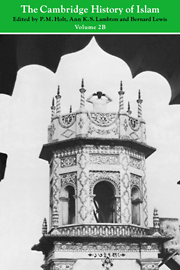Book contents
- Frontmatter
- Introduction
- PART VIII ISLAMIC SOCIETY AND CIVILIZATION
- 1 THE GEOGRAPHICAL SETTING
- 2 THE SOURCES OF ISLAMIC CIVILIZATION
- 3 ECONOMY, SOCIETY, INSTITUTIONS
- 4 LAW AND JUSTICE
- 5 RELIGION AND CULTURE
- 6 MYSTICISM
- 7 REVIVAL AND REFORM IN ISLAM
- 8 LITERATURE
- 9 ART AND ARCHITECTURE
- 10 SCIENCE
- 11 PHILOSOPHY
- 12 WARFARE
- 13 THE TRANSMISSION OF LEARNING AND LITERARY INFLUENCES TO WESTERN EUROPEo
- Dynastic List
- Bibliography
- Glossary
- Index
- References
2 - THE SOURCES OF ISLAMIC CIVILIZATION
from PART VIII - ISLAMIC SOCIETY AND CIVILIZATION
Published online by Cambridge University Press: 28 March 2008
- Frontmatter
- Introduction
- PART VIII ISLAMIC SOCIETY AND CIVILIZATION
- 1 THE GEOGRAPHICAL SETTING
- 2 THE SOURCES OF ISLAMIC CIVILIZATION
- 3 ECONOMY, SOCIETY, INSTITUTIONS
- 4 LAW AND JUSTICE
- 5 RELIGION AND CULTURE
- 6 MYSTICISM
- 7 REVIVAL AND REFORM IN ISLAM
- 8 LITERATURE
- 9 ART AND ARCHITECTURE
- 10 SCIENCE
- 11 PHILOSOPHY
- 12 WARFARE
- 13 THE TRANSMISSION OF LEARNING AND LITERARY INFLUENCES TO WESTERN EUROPEo
- Dynastic List
- Bibliography
- Glossary
- Index
- References
Summary
That a civilization should have neatly identifiable sources is a concept of a more limited validity than recent intellectual habituation and customary techniques of scholarship would suggest. It presupposes the notion of developmental units of sufficiently consistent and individual character to be capable of isolation within, though not separable from, the stream of history, and it tends to imply, at least as a metaphor, the idea of a cultural compound resulting from the blending, amalgamation or coalescence of a number of pre-existing historic ingredients. Since obviously these ingredients can be recognized only in retrospect, that is to say, through the analysis of the unit in which they are submerged or active, a teleological outlook is apt to guide the eye of the diagnostician, who also may find it difficult to pry himself loose from the organicism inherent in the image whose persuasiveness only too readily obscures its purely nominalist function as a principle of order.
The concept of sources becomes meaningless in a context in which cultures or civilizations are perceived as essentially changeless, belonging to the world of ideas and withdrawn from historical process which affects or moulds only their surface manifestations. When ‘Islamic culture and civilization’ are seen to be ‘as old as the human race itself’, and ‘Islamic culture’ is defined as ‘an interpretation of the will of God as conveyed to humanity through the agency of the prophets starting with Adam and culminating in Muhammad’, it is taken out of history, to which it is not really restored by the statement that ‘With Prophet Muhammad, however, Islamic culture got an extraordinary impetus, attaining to the zenith of its grandeur.’
- Type
- Chapter
- Information
- The Cambridge History of Islam , pp. 469 - 510Publisher: Cambridge University PressPrint publication year: 1977
References
- 1
- Cited by



